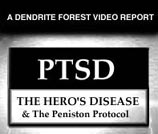Brief presentations of information on
aspects of PTSD:
- PTSD and Community Violence
- PTSD in Children
- PTSD and Problems with
Alcohol Use
- PTSD and Relationships
- PTSD and the Family
- Physical Health and
PTSD
- Survivors of Natural
Disasters
- Epdimological Facts About
PTSD --How
many people exposed to traumatic events have PTSD?
- Disaster and Rescue
Workers and PTSD
- Warning
Signs
Warning signs of trauma-related stress, from Los Angeles County Department of Mental Health.
- Warning
Signs from APA
Warning signs of trauma-related stress, from the American Psychological Assn.
- Victim Emotional Health
Emotional health issues for victims, from the American Red Cross.
- Coping
Suggestions
Coping suggestions, from Los Angeles County Department of Mental Health.
- Normalizing
Emotions
You are not alone! description of normal emotions following a disaster, from the American Red Cross.
-
Post-Traumatic Stress Disorder: An Overview" Matthew J. Friedman
The
Peniston Protocol
PTSD Treatment
VA NATIONAL
CENTER FOR PTSD
Research and Education on Post-Traumatic
Stress Disorder
PTSD and PHYSICAL
HEALTH
A National Center
Fact Sheet
Research suggests that a relationship exists between exposure to traumatic events (such as war, crime, or natural disaster), experiencing the symptoms of post-traumatic stress disorder (PTSD), and problems with physical health. Health problems associated with PTSD may involve a variety of bodily systems, including the cardiovascular, neurological, and gastrointestinal systems.
PTSD may promote poor health through a complex interaction between biological and psychological mechanisms. Study of these mechanisms is in progress at the National Center for PTSD and at other laboratories around the world. Current thinking is that the experience of trauma brings about neurochemical changes in the brain. These changes may have biological effects on health, such as:
- vulnerability to hypertension and atherosclerotic heart
disease
- abnormalities in thyroid and other hormone functions
- increased susceptability to infections and immunologic
disorders
- problems with pain perception, pain tolerance, and chronic pain syndromes
Neurochemical changes associated with trauma exposure and PTSD also may have psychological and behavioral effects that can further impair physical health, such as:
- depression
- social isolation and troubled relationships with other
people
- increased hostility and anger
- poor coping skills
- increases in alcohol consumption and smoking
- poor eating habits
Both male and female Vietnam and Persian Gulf veterans with PTSD have been shown to have poorer health and greater utilization of medical services than did comparable veterans without PTSD. Similar effects have been found in survivors of earthquakes, hurricanes, and other natural disasters; in crime victims, especially women who have experienced sexual assault; and in survivors of child abuse.
Studies of patients seeking physical health care show that many have been exposed to trauma and experience post-traumatic stress, but have not received appropriate mental health care. Recent evidence suggests that timely brief psychological assistance can prevent or greatly reduce the severity of PTSD.
This factsheet was based on:
- "Trauma,
PTSD, and Physical Health" by Paula P. Schnurr, PTSD
Research Quarterly 7(3): 1-6 (Summer 1996)
- "The Relationship Between Trauma, Post-Traumatic Stress Disorder, and Physical Health" by Matthew J. Friedman and Paula P. Schnurr, in Neurobiological and Clinical Consequences of Stress: From Normal Adaptation to Post-Traumatic Stress Disorder, edited by Matthew J. Friedman, Dennis S. Charney, and Ariel Y. Deutch (Philadelphia: Lippincott-Raven, 1995), pp. 507-524.

